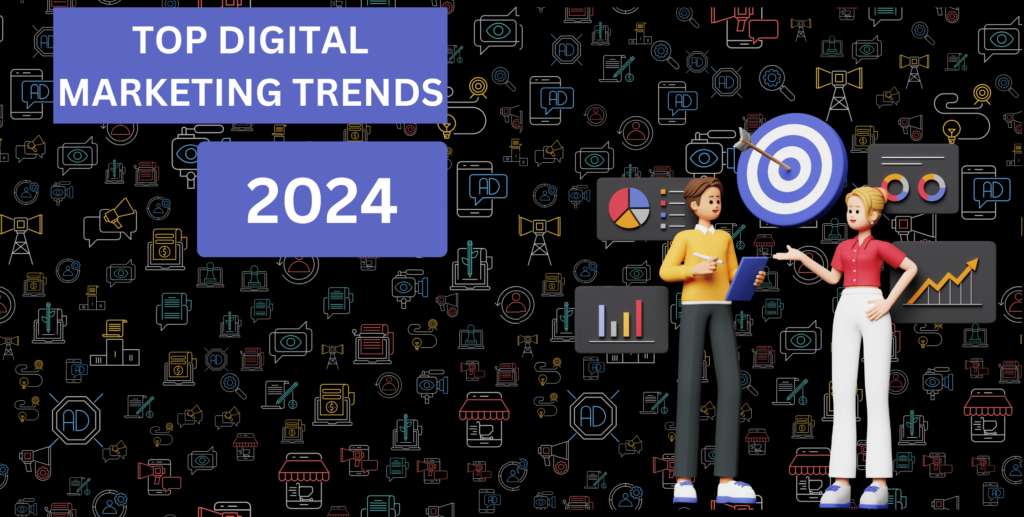Industry Insights: Digital Marketing Trends
In the fast-evolving realm of digital marketing, staying ahead of trends is not just beneficial—it’s essential for maintaining competitiveness and relevance. As technology continues to reshape consumer behaviors and business practices, understanding the latest digital trends becomes crucial for crafting effective marketing strategies. Let’s dive into the emerging trends that are reshaping the digital marketing landscape:

1. Artificial Intelligence (AI) Integration
Artificial Intelligence continues to revolutionize digital marketing by enhancing personalization, automation, and predictive analytics. AI-powered tools analyze vast amounts of data to uncover actionable insights, optimize ad campaigns, and deliver personalized experiences to consumers. From chatbots that provide instant customer support to predictive analytics that forecast consumer behavior, AI is reshaping how brands engage with their audiences.
2. Voice Search Optimization
The prevalence of voice-enabled devices like smart speakers and virtual assistants has led to a surge in voice search queries. Optimizing content for voice search involves using natural language keywords, answering common questions concisely, and ensuring your website is structured for featured snippets. Brands that adapt to voice search trends can enhance their visibility in search engine results and cater to the growing number of voice-first users.
3. Video Marketing Dominance
Video content continues to reign supreme across digital platforms. From short-form videos on TikTok and Instagram Reels to long-form content on YouTube, video marketing allows brands to engage audiences in more immersive and memorable ways. Live streaming, interactive videos, and personalized video messaging are gaining traction as brands seek to connect authentically with consumers through visual storytelling.
4. Ephemeral Content on Social Media
Ephemeral content, such as Stories on platforms like Instagram, Facebook, and Snapchat, has transformed how brands engage with audiences in real-time. These temporary posts encourage urgency and FOMO (Fear Of Missing Out), prompting immediate engagement from viewers. Brands leverage ephemeral content to showcase behind-the-scenes moments, product launches, and limited-time offers, fostering a sense of exclusivity and urgency among followers.
5. Privacy and Data Protection
As consumers become increasingly aware of data privacy issues, brands are prioritizing transparency and compliance with regulations like GDPR and CCPA. Building trust through responsible data handling practices not only strengthens customer relationships but also ensures legal compliance and mitigates risks associated with data breaches. Brands that prioritize privacy and data protection gain a competitive edge in an era of heightened consumer scrutiny.
6. Interactive Content Experiences
Interactive content formats, such as quizzes, polls, and interactive infographics, captivate audiences by encouraging active participation. These engaging experiences not only entertain users but also provide valuable insights into consumer preferences and behaviors. Brands leverage interactive content to educate, entertain, and collect user-generated data, driving higher engagement and conversions.
7. Augmented Reality (AR) and Virtual Reality (VR)
AR and VR technologies are reshaping digital marketing by offering immersive brand experiences. Retailers use AR to allow customers to virtually try on products, while travel brands offer virtual tours of destinations. Marketers leverage these technologies to create memorable experiences that differentiate their brands and drive engagement. As AR and VR become more accessible, their adoption in marketing strategies is expected to grow.
8. Sustainability and Purpose-Driven Marketing
Consumers increasingly expect brands to demonstrate commitment to sustainability and social responsibility. Purpose-driven marketing initiatives that support environmental causes, social justice, or community initiatives resonate with socially-conscious consumers. Brands that authentically align their values with meaningful causes not only attract loyal customers but also contribute positively to society, fostering a positive brand image.
9. Omni-Channel Marketing Strategies
Omni-channel marketing integrates multiple channels, both online and offline, to create seamless and cohesive customer experiences. Brands use data-driven insights to deliver personalized messages across various touchpoints, ensuring consistency and relevance throughout the customer journey. By optimizing omni-channel strategies, brands enhance customer satisfaction, increase retention rates, and drive revenue growth.
10. Adaptability and Agility in Marketing
In a dynamic digital landscape, adaptability and agility are critical for success. Brands that embrace experimentation, monitor trends, and quickly pivot strategies based on data insights gain a competitive advantage. Continuous learning, staying informed about industry trends, and embracing innovation enable marketers to navigate uncertainties and capitalize on emerging opportunities effectively.
Embrace the Future of Digital Marketing
The digital marketing landscape continues to evolve at a rapid pace, driven by technological advancements, shifting consumer behaviors, and regulatory changes. By embracing these emerging trends and incorporating them into your marketing strategies, you can position your brand for growth, relevance, and success in an increasingly competitive marketplace.
Stay tuned for more updates and insights on the latest digital trends shaping the future of marketing. Explore innovative approaches, leverage new technologies, and adapt your strategies to meet the evolving expectations of today’s digital-savvy consumers.

